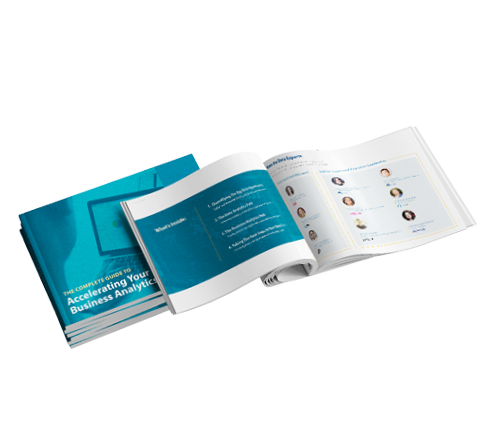Request Information
We're Sorry
There was an unexpected error with the form (your web browser was unable to retrieve some required data from our servers). This kind of error may occur if you have temporarily lost your internet connection. If you're able to verify that your internet connection is stable and the error persists, the Franklin University Help Desk is available to assist you at helpdesk@franklin.edu, 614.947.6682 (local), or 1.866.435.7006 (toll free).
Just a moment while we process your submission.

What's the Best Degree for a Business Analyst?
We’re in a Matrix-like moment with data all around us, being generated from everything we do - Amazon purchases, Facebook feed curation, Netflix recommendations, internet searches.
Just a decade ago, data was just … there. There was no cloud to store it in. And even if there was, there certainly wasn’t the talent available to turn it into strategic business insights. Today, huge amounts of data can be stored easily and affordably. However, there remains a shortage of skilled professionals in almost every industry to interpret that data.
That’s why business analytics professionals are so important, and sought after. These professionals, who can manage, analyze and derive insights from data and connect those insights to business decisions, are in growing demand.

The opportunity is there. But how do you capitalize on it?
What Do Business Analytics Professionals Do?
“Business analytics professionals analyze data and assess requirements from a business perspective. They explore data and utilize, manipulate and apply well-established data models based on different business scenarios to make decisions,” says Jiang Li, Ph.D. who serves as chair of the Business Analytics master's program and lead faculty of the Data Analytics master's program at Franklin University.
While every day is different, a “typical” day for a business analyst could be:
- Communicating with senior leaders to align on organizational goals.
- Working with stakeholders to help them understand the benefits of new technology or strategies that will be used to meet those goals.
- Using data modeling to explore different solutions, their risks, benefits, and impacts. They’ll also curate available data to help an organization plot trends, uncover areas of concern, discover opportunities for growth, and craft solutions.
- Propose opportunities for business growth based on research and results uncovered.
- Craft documentation detailing the proposed solutions that were “discovered.” Included will be a broad implementation and maintenance plan.
- Oversee the implementation of any new systems and related technology.
“Business analytics professionals focus on applying the insights derived from data to address business problems,” Li says. “This role identifies where companies could do better, and how to get there using data.”
Get a FREE roadmap that includes insider information to help you maximize the many opportunities in the fast-growing field of Big Data.
What Qualifications Does a Business Analytics Professional Need?
There are three categories of skills that, when mastered, can lead to success for a business analytics professional. And a comprehensive university degree program can provide the foundation for these skill sets.
Technical Skills
Strong technical skills will help with delivering data-driven recommendations and reports to executives and stakeholders.
Tools used include:
- Database languages (SQL)
- Programming languages (R, Python)
- Data manipulation (Excel and SAS)
- Data visualization (Tableau & Microsoft Power BI)
Analytical Mindset
Business analytics professionals dig into the insights buried in data and use what they find to help companies make better business decisions or better products.
To do this successfully you must:
- Determine practical implications of a data analysis
- Have the ability to see through problems to solutions
- Use forecasting, budgeting and financial analysis skills
- Discern financially and functionally reasonable business plans
What Education & Training Should I Pursue?

Most employers want someone who can make a difference from the start. This generally means having a mixture of practical experience that starts with a bachelor’s degree. But to succeed as a business analytics professional it’s important to stay current through education, being a part of research organizations and earning (and maintaining) certifications.
Certifications Build Experience
There are a number of professional credentials that can be earned in the business analytics field. One of the most prominent organizations where you can earn these credentials is through the International Institute of Business Analysis, which offers:
- Certified Business Analysis Professional (CBAP®): A professional certification for individuals with extensive business analysis experience, the CBAP demonstrates that professionals have the knowledge, competencies and experience to be a highly effective senior business analysis professional.
- Agile Analysis Certification (IIBA®-AAC): This certification strengthens skills and expertise, focusing on applying an agile perspective within a business analysis framework.
- Business Data Analytics Certification (IIBA®- CBDA): Recognizes a professional’s ability to effectively execute data analysis related work in support of business analytics initiatives.
- Cybersecurity Analysis Certification (IIBA®- CCA): This credential allows professionals to learn in-demand cybersecurity skills and prove their ability to use these skills in a business analytics capacity.
Certifications may also be earned through the International Qualification Board for Business Analysis, International Requirements Engineering Board and Project Management Institute.
What Should I Major In To Be a Business Analyst?
There are several bachelor’s degree programs that can provide a solid foundation for starting your career in business analytics.
- B.S. in Business Administration: This degree is ideal for business analytics professionals because it provides a strong foundation in business theory and strategy. Students may want to choose this path for its broad-based curriculum that will prepare them to work in any business function.
- B.S. in Financial Management: This degree is a natural fit for business analysts because it focuses on building both math and business skills. Students may choose this path if they want to focus on optimizing business financial performance—some of the most consequential decisions a business makes.
- B.S. in Statistics: Using data to confront real-world problems is the core role of a business analytics professional, making this degree a natural fit. Students may choose this path if they want to develop core mathematical decision-making skills.
Do I Need a Master’s Degree to Succeed?
A master’s degree can prepare professionals to lead cross-functional or specialized teams. It can also open up leadership opportunities and salary increases.
Four popular master’s degree paths for analytics-minded leaders are:
- Master’s in Business Analytics: A master’s degree in business analytics is ideal for leaders who want to use data to champion innovation, identify new business opportunities and improve current products or services to win more customers. Specializing in analytical functions will put business leaders at the forefront of growth.
- Master of Business Administration (MBA): The MBA is the most popular advanced degree for well-rounded business leaders. An MBA provides a solid foundation in all major business functions, giving professionals the agility to work across functions and make strategic and holistic decisions.
- Master’s in Marketing and Communication: Marketing is one of the most prominent business functions where analytics plays a central role. Today’s focus on digital channels and tracking success against key performance indicators makes a master’s degree in marketing a strong choice for professionals who want to marry an analytical and creative mindset.
- Master of Science in Data Analytics: Learn to manage, visualize and analyze complex data sets in order to find solutions based on real-world actions. There’s an additional focus on applying analytics methods to solve business problems and effectively communicate the results through a combination of relevant interactive coursework.
Start Your Business Analytics Career
With an M.S. in Business Analytics from Franklin University, you could get the skills and experience you need to help transform a business.
Part of the strength of the program at Franklin is the support behind it. You’re exposed to not only theory and practice but practical, real-world experience from the seasoned faculty. The mix of education and experience will give you a strong career boost.
Learn more about how you can create a challenging career for yourself while fulfilling the growing demand for business analytics professionals.





